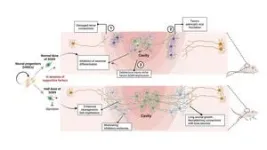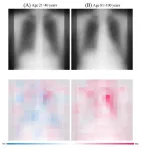(Press-News.org) MIAMI, FLORIDA (Aug. 17, 2023) – Researchers with Sylvester Comprehensive Cancer Center at the University of Miami Miller School of Medicine have been awarded a grant from the U.S. Department of Defense (DoD)’s Congressionally Directed Medical Research Program to target chemotherapy resistance in pancreatic cancer.
The $800,000, three-year grant is the first DoD award to Sylvester to study pancreatic cancer, a disease characterized by extreme resistance to chemotherapy and other treatments and dismal survival rates.
Pancreatic ductal adenocarcinoma is the most common and aggressive form of this disease. It accounts for more than 90% of cases and leads to almost 500,000 deaths per year worldwide, according to the National Institutes of Health (NIH).
In the U.S., about 65,000 people will be diagnosed with pancreatic cancer this year, and more than 50,000 will die from it, per estimates from the American Cancer Society. Statistics from NIH indicate it is the third-leading cause of cancer death in this country, after lung and colorectal cancer, and the number of cases in the U.S. and Europe is expected to double over the next decade, due to rising rates of obesity and type 2 diabetes.
“Pancreatic cancer remains difficult to diagnose because there are no good screening tests and its symptoms do not present until the disease has advanced to later stages,” said Jashodeep Datta, M.D., associate director of Translational Research at Sylvester’s Pancreatic Cancer Research Institute and principal investigator for the new study. “Additionally, it’s highly resistant to standard treatments due to diverse and disparate factors in the tumor microenvironment.”
Datta, who is also UM Miller’s DiMare Family Endowed Chair in Immunotherapy and a surgical oncologist specializing in pancreatic and hepatobiliary cancers, says this DoD study will support a new arm of his research program that aims to advance knowledge of the intricate signaling circuitry between myeloid-derived suppressor cells (MDSCs) and pro-inflammatory cancer-associated fibroblasts (CAFs) within the pancreatic tumor microenvironment. MDSCs are a component of the innate immune system that becomes hijacked by tumors, and early data from the Datta lab reveals that their intimate relationship with CAFs are a major driver of treatment resistance in pancreatic cancer.
In the proposed study, Datta will examine the precise signaling mechanisms by which these MDSCs and CAFs interact using innovative preclinical mouse models and single-cell sequencing methodologies. Then, using high-dimensional tissue imaging, the study will determine if spatial relationships between ecosystems of MDSCs and CAFs correlate with poor chemotherapy responses in patients receiving treatment at Sylvester.
Lastly, Datta and his colleagues seek to target this crosstalk between MDSCs and CAFs using a novel nanoengineered immunotherapy that specifically and selectively disrupts signaling mechanisms in MDSCs. “Our study will focus on catalyzing development of a bold immunotherapy to disrupt signaling connections that help drive tumor chemoresistance,” Datta explained.
“Our study will be one of the first to examine the intricate communication between these two players in the tumor microenvironment,” he said. “Activated MDSCs instigate pro-inflammatory CAF signaling. In turn, CAFs act as cellular antennae that transmit inflammatory cues that beckon more MDSCs to infiltrate tumors, sustain immunosuppression and promote therapy resistance in pancreatic cancer cells.”
Dr. Datta and his team want to investigate the signaling cascades that underlie these MDSC-CAF networks and devise a cell-specific engineering approach to prevent activation of this inflammatory pathway.
He noted that it’s important to have specific targets in the tumor microenvironment because “shotgun” therapies produce mixed effects. “We hope to restrict our targeting selectively to MDSCs and inhibit their activation while avoiding unwanted complications that can occur with current treatments,” he explained. “We want to avoid adversely impacting helpful immune cells, such as T-cells, as well as other non-cancerous cells in our bodies.”
Another key aspect of the study is their plan to investigate if increased density of MDSC-CAF “neighborhoods” in tumors from Black patients may explain the disturbing racial disparities associated with chemotherapy responses to the disease, Datta added.
Nanoparticles to Target MDSCs
For this study, Datta will collaborate with co-investigator Shanta Dhar, PhD, assistant director of Technology and Innovation at Sylvester and associate professor of biochemistry and molecular biology. Dhar’s research focuses on nanoparticle-assisted delivery of therapeutics for cancer and cardiovascular and neurodegenerative diseases.
“We have been working together to design a nanoparticle that can penetrate the tumor and deliver a medication payload right to the MDSCs,” Dhar said. “It’s exciting because we’re approaching the problem of tumor resistance from a different perspective.”
Rather than trying to penetrate the dense stroma surrounding the cells, she explained, they will target the key cells that generate pro-tumor signaling cascades in the microenvironment.
Equally important, the nanoparticles used for therapeutic purposes are biodegradable polymers that can be reproduced at scale for wide application if this approach proves successful, Dhar added.
“Hopefully, this study will be a great example of translational science, taking laboratory findings into development of effective treatments to help patients and families facing the daunting challenge of pancreatic cancer,” Dhar concluded.
For more information on this study, please visit the Sylvester InventUM blog.
# # #
END
(Philadelphia, PA) – A single injection of a novel CRISPR gene-editing treatment safely and efficiently removes SIV – a virus related to the AIDS-causing agent HIV – from the genomes of non-human primates, scientists at the Lewis Katz School of Medicine at Temple University now report. The groundbreaking work complements previous experiments as the basis for the first-ever clinical trial of an HIV gene-editing technology in human patients, which was authorized by the Food and Drug Administration (FDA) in 2022.
The preclinical study, published online ...
As urban areas expand, animals increasingly find themselves living in towns and cities. While some animals may benefit from milder temperatures and fewer natural predators in urban settings, they also have to cope with pollutants and changes in their diet. Previous research has shown that animals in cities are “duller” in terms of yellow-orange-red colour tones compared to their non-urban counterparts. However, previous studies have only focused on single geographic locations.
“We used feather samples collected from great tits in cities and forests across Europe. Different methods all confirmed that urban great tits ...
(Santa Barbara, Calif.) — We’ve managed to accumulate so much plastic trash that it’s daunting to think about what could be done with the tons upon tons of nonbiodegradable waste. And as much as we are trying to scale back our dependence on single-use plastics, we continue to add to the global plastic trash hoard. Events like the COVID-19 pandemic only served to expand their use for personal protective equipment and disposable and take-away packaging.
But, for researchers at UC Santa Barbara, one person’s single-use packaging ...
Group A streptococci are fairly common bacteria that can cause, among other things, strep throat or impetigo. However, if the bacteria become invasive, the situation can become very dangerous. In this case, the name sometimes changes to murder bacteria or flesh-eating bacteria and can give rise to life-threatening conditions such as blood poisoning and septic shock, or soft tissue infections that may make an amputation necessary.
Invasive streptococcal infections have increased in recent decades. The reason for this is not fully understood.
The outcome of infections can ...
Prolonged exposure to low-dose ionising radiation is associated with a higher risk of death from cancer than previously thought, suggests research tracking the deaths of workers in the nuclear industry, published in The BMJ today.
The findings should inform current rules on workplace protection from low-dose radiation, say the researchers.
To date, estimates of the effects of radiation on the risk of dying from cancer have been based primarily on studies of survivors of atomic bombs dropped on Japan at the ...
Access to a smartphone alcohol intervention app helped university students to cut down their overall alcohol consumption and the number of days they drank heavily, suggests a study published in The BMJ today.
Unhealthy drinking is the biggest risk factor to health for 15 to 49-year olds, and unhealthy use of alcohol is especially prevalent among adult students, prompting the authors to design a smartphone app to encourage healthier drinking among this group.
The authors tested the app in 1770 university students who had screened positive for ...
*Please see end of press release for a link to the embargoed content*
Peer-reviewed / Randomised Controlled Trial / People
A randomised controlled trial of 860 women requesting emergency contraception found 95% of pregnancies were prevented following combined treatment with levonorgestrel and the anti-inflammatory medication piroxicam, compared to 63% of pregnancies being prevented when levonorgestrel was taken alone.
This is the first randomised trial where piroxicam has been studied for its contraceptive action in humans.
The authors say, if these results can be reproduced in future studies, co-treatment with piroxicam and levonorgestrel ...
Osaka, Japan - What if “looking your age” refers not to your face, but to your chest? Osaka Metropolitan University scientists have developed an advanced artificial intelligence (AI) model that utilizes chest radiographs to accurately estimate a patient’s chronological age. More importantly, when there is a disparity, it can signal a correlation with chronic disease. These findings mark a leap in medical imaging, paving the way for improved early disease detection and intervention. The results are set to be published in The Lancet Healthy Longevity.
The research team, led by graduate student ...
Epilepsy in infants ranges in severity and can leave caregivers with questions about their child’s health. While genetic testing to help determine the cause of epilepsy is possible, comprehensive testing does not always happen routinely and it can take a long time, leaving families waiting for answers.
Published in The Lancet Neurology, this international study sequenced the genomes of 100 infants with unexplained seizures, along with their parents, from four countries (England, USA, Canada and Australia) to better understand the potential strengths of early, broad genome sequencing (a process ...
The BMJ’s editor in chief is urging the Academy of Medical Royal Colleges and its members to establish a standard for declaring payments they receive from industry and patient groups in the wake of a recent investigation by The BMJ into such payments.
The investigation, published by The BMJ in July,* found that royal colleges, responsible for doctors’ and some other healthcare professionals’ education and training, had received more than £9m in payments from drug and medical device companies since 2015 but that they didn’t always disclose these payments publicly in their annual reports.
In an open letter to the institutions ...




